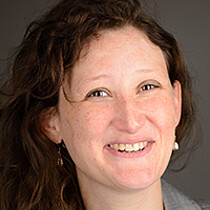

Video: Monday, 10 July 2017
Artificial intelligence (AI) is poised to take over many tasks formerly performed by humans. While the benefits of bots are already making our daily lives more efficient, the underlying question remains: is my job threatened by AI? How will my organisation survive? How do I remain relevant in the digital workplace?
At ‘RSM Discovery Live: Who can beat the bots?’, presented on Wednesday 31 May 2017 at Rotterdam School of Management, Erasmus University (RSM), those thorny questions were addressed by guest speakers comprising leaders in corporate L&D, HR and corporate learning architecture. They presented cases taken from their organisations’ current initiatives aimed at integrating humans and technology in the workplace. Their perspectives and experiences were discussed by an expert panel made up by RSM Professor Henk Volberda and Marlies Timmerman, CEO of Horizon Training & Development.
Special emphasis at the afternoon event was placed on leadership and employee development and HR solutions in a working environment destabilised by unpredictable technological advancement: the Fourth Industrial Revolution (the first was steam power; second, electricity; and the third was electronics and IT).
Klaus Schwab, founder and director of the World Economic Forum, has described the fourth Industrial Revolution’s impact: “ … when compared with previous industrial revolutions, the fourth is evolving at an exponential rather than a linear pace. Moreover, it is disrupting almost every industry in every country. And the breadth and depth of these changes herald the transformation of entire systems of production, management, and governance.”
Both of the experts on the panel, Professor Henk Volberda and Marlies Timmerman, emphasised that flexibility is the key to survival for organisations, their leadership and employees in the current upheavals accelerated by technology.
“Flexible employees are crucial to the success of digital innovations,” said Prof. Volberda. “Employees must become more entrepreneurial, curious and social. They have to invest in the depth and breadth of their knowledge base. They need knowledge from outside of their industry, job, sector … and social skills like creativity and critical thinking are most important.”
Professor Volberda noted in his presentation that firms may be underestimating the challenges facing them and that investment in their employees to develop new skills was of key importance. Firms that invest only in new technologies have shown a six per cent decrease in their workforce; while firms that invest in the ‘soft side of innovation’ – people – have experienced an increase of eight per cent in their workforce. “If you don’t invest in human capital, you will see a loss of jobs. But if we really train the employees, adapt organisational structures and facilitate more self-organising teams then you can really harvest a lot from new technologies,” Volberda said.
“Flexible companies dare to embrace talent diversity,” says Marlies Timmerman, CEO of Horizon Training & Development. “In general I see the speed of change is increasing, and the complexity of issues is increasing. Companies and whole industries are looking for the Holy Grail and asking if we [the training companies] have it for them.”
In her presentation Marlies Timmerman said that because of the increasing speed and complexity of the digital workplace, management cannot focus its training budget on just a few individuals or a narrow set of skills. “Because of the speed of change you cannot cope with just a few talents,” she said, speaking of diversity of both people and skills. “You need all the talents in your organisation,” she said. “And we have to help them connect with the ‘why’ of the change.”
“We realised we didn’t have a fact-based picture of what our leadership looks like. We decided to measure our top teams in a thorough 360-degree process. What we found is that most of our leaders have a pretty small repertoire of leadership styles; they tend to be very, very good at a few styles, especially those that are effective in the short-term.”
In her presentation, Karen Daleboudt discussed some of the initiatives adopted by Randstad to help leadership (and employees) remain robust and effective in the new digital workplace. One overall strategy: Tech and Touch. Tech requires curiosity and a willingness to change, while touch needs passion, creativity and empathy. “On the one hand we invest in all kinds of digital innovations to make our business processes more efficient; on the other we realise that social innovation, touch, is very important,” she said.
“The problem at ASML isn’t money, it’s time – we don’t have time to develop trainings because our experts’ agendas are fully packed with work. As a corporate learning architect I look for ways that we can, with digitalisation, speed up knowledge transfer. Instead of sitting in an old-fashioned classroom, how can we speed up the knowledge transfer process for everybody?”
ASML is a company with an important function in the new world of digitalisation: as a microelectronics company it makes the ‘bits’ that make the bots. But the organisation experiences the same issues as any other in terms of knowledge sharing: “There are 18,000 people at our company who are busy and would rather look at their own work,” said Karel Driesse. The answer: gamification – using the crowd to innovate by using a game for knowledge sharing, and to generate new ideas and potential solutions. This is ‘social learning’ that really works, making it easy for colleagues to collaborate and share. “The downside is that if you decide at the game’s end there’s a great idea that has come from collaboration you have to be sure you do something with that idea. You need a budget to make it happen. On the operational side we still have to learn how to deal with it.”
During the plenary panel certain themes emerged consistently:
1. Employees must become ‘intrapreneurs’ to survive: more entrepreneurial, engaged and resourceful on the job.
2. Leadership models have changed. Leaders need to listen, connect, and understand what a coaching leader or servant leader does. They need a holistic view of the organisation in the context of digitalisation.
3. The old structures inherent in HR – long-term contracts, benefits, training, bonuses, remuneration based on short-term wins – are disappearing faster than we think.
Professor Henk Volberda: “What struck me is that at ASML you see the use of new software to help people in this ‘learning game’ – and in the end I think that supports my message of ‘employee first, technology second’.”
Karen Daleboudt: “I think it is ‘entrepreneurship’ and ‘intrapreneurship’ that sticks with me the most.”
Marlies Timmermans: “What strikes me is that there is so much to pay attention to. We need to look at culture, servant leadership, at entrepreneurial attitudes and the ability to learn. Let’s get to it!”
Karel Driesse: “As HR you can push and pull and do whatever you want and at the end you have to listen to the employee. I think if you at least make the employee central and make the environment a place they like to be, things will happen.”
‘RSM Discovery Live: who can beat the bots?’ was the launch of a new kind of executive event. Informal, designed for interaction, and highly topical, the relevance of RSM’s management theory to the world of practice (and vice versa) became clear in a short, energising 2.5 hours. Why had some of the audience members decided to attend? And what did they learn?
Remko Dijkman, a senior risk analyst for a large bank, said his most important takeaway in terms of knowledge was the idea that investment in technology must be matched by that of developing employee skills – the two must go together. “And on the practical side, the example of online gamification for brainstorming and developing ideas – that’s really adaptable for our bank. We already do hackathons, but that’s a physical meeting; online gamification would be faster.” Why was he at RSM Discovery Live? “In the banking industry we must change, and we must embrace technology. Otherwise in five years we won’t exist anymore.”
Young entrepreneurs like Debbie Brongers, owner of Pumpkin Editorial Services, were also in attendance. “My main conclusion and my main consolation, is that despite all the changes we need to adapt to, the human factor remains of great importance,” she said. “We human beings who are involved in this digital arena should do a lot of self-reflection and know who we are – we have a very big role to play. That was the biggest takeaway, almost a revelation!”


Science Communication and Media Officer

Corporate Communications & PR Manager
Rotterdam School of Management, Erasmus University (RSM) is one of Europe’s top-ranked business schools. RSM provides ground-breaking research and education furthering excellence in all aspects of management and is based in the international port city of Rotterdam – a vital nexus of business, logistics and trade. RSM’s primary focus is on developing business leaders with international careers who can become a force for positive change by carrying their innovative mindset into a sustainable future. Our first-class range of bachelor, master, MBA, PhD and executive programmes encourage them to become to become critical, creative, caring and collaborative thinkers and doers.
